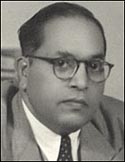Untouchable
by Mohan Tiptur, OhMyNews, Aug 5, 2006
Ambedkar's attraction to Buddhist philosophy
Seoul, South Korea -- Dr. Bhimrao Ramji Ambedkar, the savior of untouchables, was born on April 14, 1891, at Mhow (now in the state of Madhyapradesh) in India. He belonged to the lowest caste among Hindus; he was an outcast.
 << B.R. Ambedkar
<< B.R. Ambedkar
The untouchables had to sit separately in schools. They were not taught well in schools. They were not allowed entry into temples or the residences of upper caste Hindus. Higher education was denied to untouchables. Yet with the help of the king, Gaekwad of Baroda, he went to Columbia University, in New York, and earned his Ph.D. in Economics in 1917. His thesis: "The Evolution of Provincial Finance in British India."
After returning to India, he could not serve the king as agreed upon because the other Hindus ill-treated him. Hence, he took a job teaching at Sydenham College in Bombay and later studied law at Gray's Inn in London. At last, due to many humiliating experiences he decided to defend the poor and illiterate untouchables against the atrocities of upper-caste Hindus.
He researched the origin of untouchability and dug out from history the fact that they were the broken men, the first followers of Buddha. They lived in ghettoes outside the cities because they were broken men from other tribes who were not allowed into Hindu settlements. The Buddha preached them his religion, ate with them, and lived among them. They called themselves Nagas because they worshipped snakes. The Hindus called them Dravidas, Dasas, Dasyus, and Rakshas, among other names.
Ambedkar was proud that his ancestors were the first supporters of Buddhist philosophy. He thought that Hindu philosophy had weakened the human mind through its restrictions, superstitions, caste system, and untouchability, whereas Buddha's philosophy was rationalist and encouraged free thinking and practicality. Naturally, it strengthened the human mind and there arose kingdoms of Nagas out of the broken men. Naga kings patronized Buddhism. It spread far and wide. Later, in the third century B.C., during the reign of Ashoka, the popularity of Buddhism reached its zenith.
Ambedkar appreciated and loved Buddhism so much that he converted to Buddhism in 1951 along with his followers, who were nearly three lakh (300,000) in number.
He openly accepted that his highest teacher was Buddha. Why did he think so? What attracted him to Buddhism? The answer may lie in the following facts.
Buddhism was the ancestral religion of untouchables as explained in his book, The Untouchables. Buddha's philosophy was so simple and so practical that the simplest layman could gain results by following them. At the same time, Buddha's teachings contained the highest wisdom, which the wisest rejoice in understanding.
Buddha never insisted that his philosophy was the best. He was bold enough to let his followers freely leave the fold of Buddhism as soon as they felt that it was wrong and of no use. No other founder of another religion ever dared to do that.
Buddha never employed superstition, magic, or miracles. He followed the path of rational discussion and persuasion to preach to his followers.
Buddha never claimed divinity for himself in any form. He remained a man in the beginning, in the middle, and in the end. He never desired to be called God, God's messenger, or God's son.
Buddha's effort in his quest for knowledge is a model to us all. He left no great teacher of his time un-consulted. Yet, they could not give a satisfactory answer to his problem. He decided to seek the answer on his own. For this, he followed the path of meditation, self-torture, and self-denial, but in vain. At last, he realized the middle path to enlightenment.
And what was his quest for? His problem was not selfish. He wanted to know why dukkha existed on earth. To find the solution to the universal suffering of mankind, he renounced his happiness, family life, and kingdom.
Maybe all these aspects of the life of Buddha attracted Ambedkar.

 << B.R. Ambedkar
<< B.R. Ambedkar 